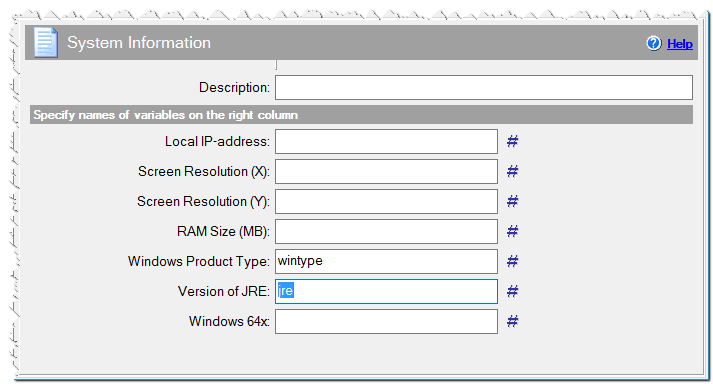System Information
You can use this command for obtaining some system parameters. Specify the result variable for the parameter that you want to obtain. The value of the parameter will be written into the corresponding variable.
Description
Optionally, you may add comments here describing the purpose of this element.
Host Name
Returns the the standard host name for the local computer.
Host Name [ Full ]
Returns the the full host name for the local computer. If using the DNS or similar resolution system, it is the Fully Qualified Domain Name (FQDN) to the return.
Local IP-address
Returns the local IP-address of the user's machine.
Local IP-address [ List ]
Returns the IP addresses of the user's computer in a list. The [variable name] _count contains the number of IPs in the list.
Screen Resolution (X)
The width of the user's screen (in pixels).
Screen Resolution (Y)
The height of the user's screen (in pixels).
Screen client area Left start position (cL)
The Left position of the user's computer, the screen client area. If the tray is at the Left of the screen, this value is the width of the tray (in pixels), otherwise 0.
Screen client area Top start position (cT)
The Top position of the user's computer, the screen client area. If the tray is at the Top of the screen, this value is the tray height (in pixels), otherwise 0.
Screen client area Resolution (X)
The work area is the portion of the screen not obscured by the system taskbar. The width in pixels.
Screen client area Resolution (Y)
The work area is the portion of the screen not obscured by the system taskbar. The height in pixels.
RAM Size (MB)
RAM size in user’s computer (in megabytes).
RAM Size (MB) [ Available ]
Available RAM size in user’s computer (in megabytes).
Windows Product Type
It writes Windows Product Type to the specified varaible. For example, it allows you to know if the user has Home or Professional Edition. You can find the list of Windows product types on this web-page.
Version of JRE
The current version of Java Runtime Environment. The variable [varname]_short equals the short value of the current version. For example, you specify jre variable name then
#jre# => 1.6.0_18 #jre_short# => 1.6

System Information command
Windows 64x
The specified variable equals 1 if the user has Windows 64x. Otherwise, the variable equals 0.
System boot
The variable value that specifies how the system is started.
The variable equals 0, if Normal boot.
The variable equals 1, if Fail-Safe boot.
The variable equals 2, if Fail-Safe boot with network.
A fail-safe boot (also called SafeBoot, Safe Mode, or Clean Boot) bypasses the user startup files.
For example, you specify sysboot variable name then
if macrox_getint("sysboot")
{
msg_error( "Can not run in Safe mode", "#lcaption#" )
}
